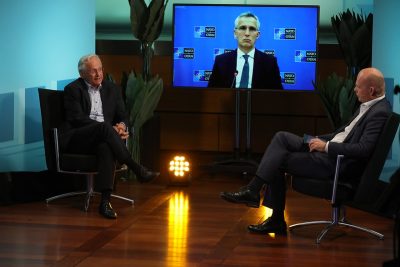As NATO Secretary General Jens Stoltenberg struggles to fend off a new war in Europe, he’s also caught in an entirely different battle back home in Norway. His attempt to become the next chief of his homeland’s central bank has suddenly set off an uproar, and he now has a majority in Parliament against him.

Stoltenberg’s second and final term as NATO leader will end this fall, but the 62-year-old former Norwegian prime minister has no intention of retiring. Newspaper Dagens Næringsliv (DN) reported last fall that Stoltenberg had emerged as a top candidate to take over as governor of Norges Bank. That was confirmed in December when his name appeared on the official list of applicants for the post that was made public by the Finance Ministry.
Therein lies the problem: The ministry in charge of hiring a new central bank boss (to replace the retiring Øystein Olsen) is now under the political control of the Labour Party-led coalition government elected in September. Stoltenberg was a longtime leader of the Labour Party himself, spent many years as Norway’s prime minister, and was thus the boss for those now in charge of potentially hiring him. Current Norwegian Prime Minister Jonas Gahr Støre served as foreign minister under Stoltenberg and the two are also personal firends. Finance Minister Trygve Slagsvold Vedum represents the Center Party, but first became a government minister when Stoltenberg tapped him to be agriculture minister in during his second term in office.
Even without such political camraderie, critics both inside and outside politics worry that Stoltenberg’s long career in politics can raise questions about the independence of the central bank. “It might have been less problematic to be appointed by the former (Conservatives-led) gang than by your own,” wrote political commentator Kjetil B Alstadheim in Aftenposten this week, “but that’s not what’s happening.”
Few doubt Stoltenberg’s qualifications for the job, given his long career in public service and academic background as a social economist. His eight years at NATO have also equipped him with unique experience in the need for preparedness and defense in an era of cyber attacks, along with an enormous network of international contacts.
It’s all his political connections in Norway that spark the most concern, even before Aftenposten reported earlier this week that Stoltenberg’s candidacy came up at a dinner party with some high-powered guests as early as a year ago. The dinner was hosted by attorney and financier Knut Brundtland, son of former Labour Prime Minister Gro Harlem Brundtland who nurtured the political careers of both Stoltenberg and Støre back in the 1990s. Guests included both Stoltenberg and Nicolai Tangen, the wealthy former hedge fund founder who’d recently won his own battle to become head of Norway’s pension fund popularly known as the Oil Fund.

Stoltenberg himself has confirmed that dinner table conversation included who might take over as new central bank chief after Olsen, that he’d further talked about the job with Tangen when they’d met on a flight to New York in September, and that he’d discussed the job with Olsen as well, on three separate occasions last fall.
In May of last year, reports Norway’s TV2, Knut Brundtland also held another dinner party at which the guests once again included Tangen and Jonas Gahr Støre, four months before Støre became prime minister. Støre, who declared even before Stoltenberg’s candidacy as central banker was confirmed that he’d have a conflict of interest in any hiring, has since had some problems explaining when exactly he learned about Stoltenberg’s interest in the job. Støre has earlier said he learned about it in the media “like everyone else,” but conceded to TV2 this week that Stoltenberg’s name had come up at the dinner party in May and, later, that Stoltenberg himself had mentioned it when the two went for a walk together in October.
Stoltenberg’s candidacy has thus set off a growing wave of political concern and lively debate that crested this week. Former Finance Minister Siv Jensen of the Progress Party, who served in the post for nearly six years and recently left politics, was among the first to publicly challenge Stoltenberg’s candidacy. She wrote in a commentary published by DN that she feared for the reputation of and confidence in the central bank if Stoltenberg is appointed as its governor, because his ties to Labour and the current Labour-led government will be questioned both at home and abroad.
Several other top politicians have said much the same, with the Conservative Party coming out strongly this week against Stoltenberg’s candidacy. The Conservatives’ Tina Bru, a former government minister who’s now the party’s finance policy spokesperson in Parliament, sharpened her party’s opposition by telling Aftenposten on Wednesday that now she wasn’t only worried about potential conflicts of interest and threats to the central bank’s political independence. News of the various dinner parties and informal conversations “leave an impression that lots of power is centralized in the same exclusive dinner clubs, close friends or an elite network,” she told Aftenposten. “That’s unfortunate, and can also increase the distance between voters and those leading the country. That in turn can damage confidence in the political system in Norway.”
“We can’t afford to jeopardize the confidence in and independence of such an important institution as Norges Bank,” Bru added. Her party leader and former prime minister, Erna Solberg, told NRK on Wednesday that she also was worried about the central bank’s independence and the “increasing unease” around Stoltenberg’s candidacy.

Even Norway’s Socialist Left Party (SV), on which Labour and Center rely to form a majority in Parliament, is adamantly opposed to naming Stoltenberg as Norway’s central banker. “This is the finance ministry’s responsibility,” Kari Elisabeth Kaski, a Member of Parliament and SV’s finance policy spokesperson, told DN this week, “but it’s important to send a clear message that we oppose employing Jens Stoltenberg as central bank chief. It would be unwise for him to have that job.”
By Tuesday, the Progress Party had also declared its opposition to Stoltenberg’s candidacy as had the Liberal Party, the Reds and the Greens. That leaves the NATO boss with a majority against him in Parliament, even though Parliament has no formal say in such an appointment. It’s up to the sitting government, but now there’s unease in the Center Party as well along with frustration.
“It seems as though the central bank chief must have political support in Parliament in order to be politically independent,” Center’s Morten Søberg, a state secretary in the finance department, told newspaper Klassekampen on Wednesday. “That’s a paradox.”
‘No grounds for disqualification’
On Tuesday came a declaration from the justice ministry that there were no legal grounds for disqualiftying Stoltenberg. Any potential conflicts of interest between Stoltenberg and Støre or Vedum, for example, would be examined on a case-by-case basis. The justice ministry admitted that its details about the relationships between Stoltenberg and members of government were “thin” but “the friendship between Stoltenberg and the prime minister and others won’t disqualify Stoltenberg” from carrying out the job of central bank chief. The ministry also believes Stoltenberg would have “a good understanding of his role” and refrain from partisan actions.

It’s all left commentators speculating nonetheless that Stoltenberg will either give up his candidacy for the job or that the ministry will ultimately appoint the other top candidate for the post, current deputy governor of Norges Bank, Ida Wolden Bache. She was long viewed as the most likely successor to current bank chief Olsen, given her long track record at the bank, glowing references and education, and an utter lack of any background in politics.
Siv Jensen, the former finance minister, also noted how Labour has long promoted women for top jobs and could get credit for putting such policies into practice. Most important, though, is that Bache is viewed as being highly competent in the field of monetary policy and steering interest rates, prepared for crises and responsible for capital management without any political baggage. “When you look at the duties of the bank, there’s little doubt that Ida Wolden Bache is the best candidate for the job,” wrote Jensen.
Bache could also take over right after Olsen retires in February. Stoltenberg won’t be released from NATO duties until October at the earliest, and it has remained unclear who’d run the bank in the meantime.
newsinenglish.no/Nina Berglund

